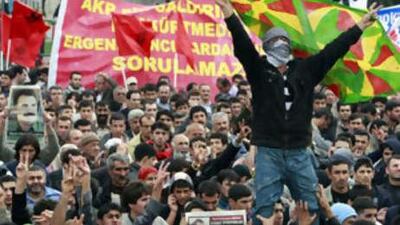A Turkish court was set to begin hearing a case today against 86 people accused of membership in a shadowy armed group that plotted to overthrow the country's Islamist-rooted government. They will answer about 30 separate charges ranging from membership in a terrorist organisation and instigating an armed uprising against the government to arson and illegal possession of weapons. Among the 86 suspects ? 46 of whom are remanded in custody ? are retired army officers, leftist politicians, members of secularist associations, journalists, academics and underworld figures.
The trial, which followed an investigation into the discovery of hand grenades in Istanbul in June 2007, has fuelled tensions between supporters of the Turkish prime minister Recep Tayyip Erdogan's Islamist-rooted government and secularists who charge that the investigation was being used to intimidate and silence opponents. The prosecution charges that the suspects ? alleged members of the ultranationalist Ergenekon group ? instigated violence and planned assassinations to foment political turmoil in Turkey and topple the ruling Justice and Development Party (AKP).
The Turkish media has reported that the group was hoping the chaos would prompt a military coup. The army, which carries significant political clout, has toppled four governments in as many decades and threatened Erdogan's government last year with stepping in to safeguard secularism. Hardcore secularists, among them the army, suspect the AKP of advancing a secret plan to introduce Islamic rule in Turkey. The party denies any such agenda and says it is loyal to the separation of state and religion.
The 2,455-page indictment holds the Eregenekon group responsible for at least two violent attacks initially blamed on Islamists ? the 2006 bombing of a secularist newspaper critical of the AKP and an armed attack on a top court the same year in which a senior judge was killed. The group is also accused of planning to assassinate several important people, among them Mr Erdogan, the former army chief Yasar Buyukanit, the 2006 Nobel literature laureate Orhan Pamuk, and Osman Baydemir, the mayor of Diyarbakir, the main city in Turkey's mainly Kurdish south-east that sits at the heart of a 24-year armed Kurdish insurgency.
Some suspects are widely seen as embodiments of the "deep state" ? a term used to describe members of the security forces acting outside the law, often collaborating with organised crime, to protect what they consider Turkey's best interests. The indictment however says that Ergenekon is not institutionally linked to the Turkish military, but has penetrated senior ranks in the army. While the trial has been applauded by pro-government and liberal circles as an unprecedented step forward in the fight against rogue elements in the state, others, especially hardcore secularists, have sharply criticised it as the AKP's means of exacting revenge on its political opponents.
*AFP

